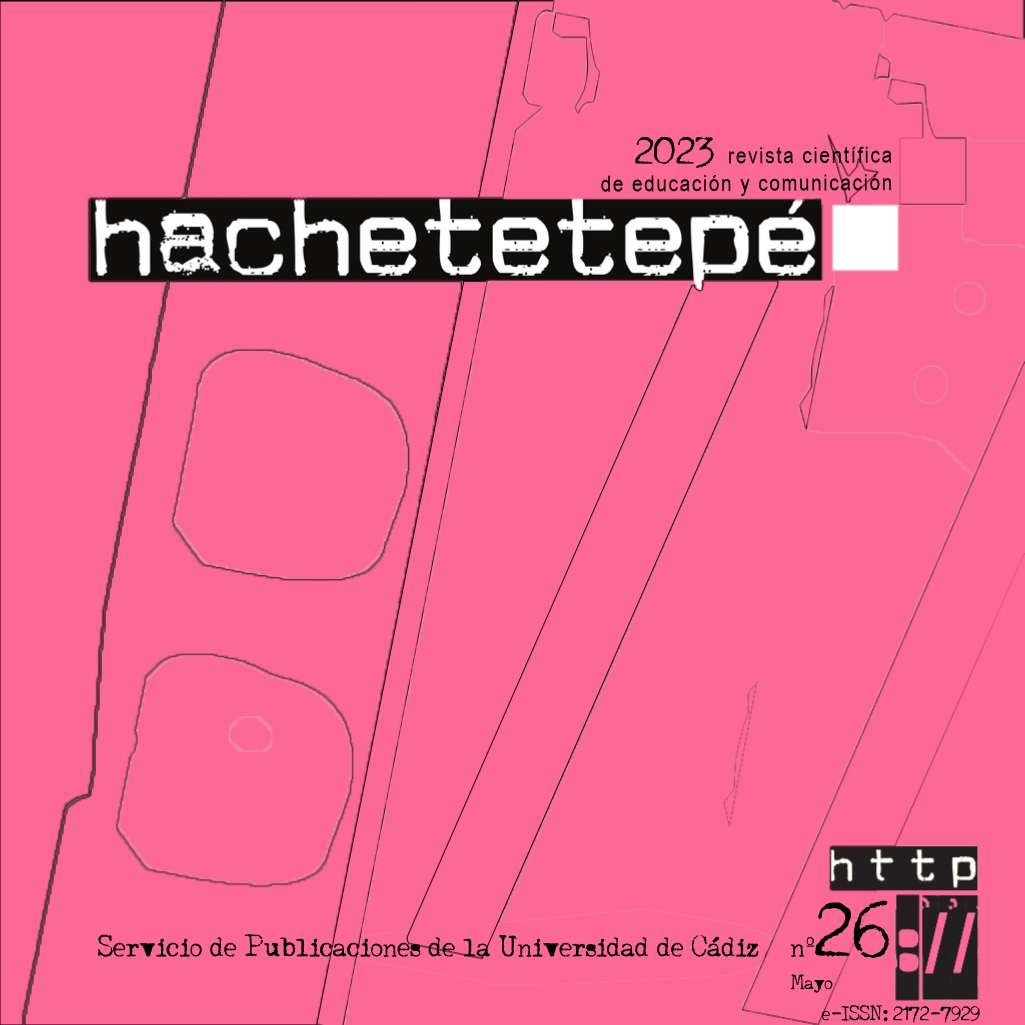Reconhecimento de contextos:cenários de aprendizagem apoiados pela tecnologia

Downloads
- PDF (Español (España)) 359
- EPUB (Español (España)) 80
- VISOR (Español (España))
- MÓVIL (Español (España))
- XML (Español (España)) 21
DOI
https://doi.org/10.25267/Hachetetepe.2023.i26.1105Informação
Resumo
O projeto, Cenários de aprendizagem apoiados pelas TIC: Desenho e contextualização de estratégias pedagógicas para ambientes de aprendizagem disponíveis, liderado pela RILPE - Rede Ibero-Americana de Liderança e Práticas Educacionais -busca gerar estratégias metodológicas que permitam o uso efetivo de ambientes de aprendizagem enriquecidos com TIC disponíveis nas instituições educacionais. Entretanto, os contextos são muito diversos, de modo que se propõe um trabalho colaborativo, primeiro para reconhecer e caracterizar os cenários tecnológicos que hoje se configuram nas instituições educacionais e, segundo, para analisar seu uso atual e sugerir outros através de metodologias ativas. Este artigo descreve a descrição dos contextos e cenários das TIC, as fases desenvolvidas, as metodologias propostas, os recursos utilizados, as informações coletadas e analisadas e os resultados, o produto de um questionário online preenchido por 618 professores de mais de seis países e analisado por pesquisadores ligados ao RILPE, Aulas Amigas, uma empresa dedicada à formação de professores em inovação educacional. O projeto busca contribuir para a introdução de tecnologias nos processos educacionais, abrindo possibilidades para pesquisas futuras.Palavras-chave
Downloads
Agências de fomento
Como Citar
Licença
Copyright (c) 2023 Olga Lucía Agudelo Velásquez, Oruam Cadex Marichal Guevara, Claudio Barrientos Piñeiro, Mario Ruiz Luis

Este trabalho está licenciado sob uma licença Creative Commons Attribution-NonCommercial-NoDerivatives 4.0 International License.
Os autores que publicaram com esta revista, aceitam os seguintes termos:
1. Manterão seus direitos autorais e garantirão à revista o direito à primeira publicação de seu trabalho, que estará simultaneamente sujeita à Licença de Atribuição Creative Commons. Podem ser copiados, utilizados, divulgados, transmitidos e exibidos publicamente, desde que a autoria, url e revista sejam citados, e não sejam utilizados para fins comerciais. Nenhuma obra derivada é permitida.
2. Podem adotar outros contratos de licença não exclusiva para a distribuição da versão publicada da obra (por exemplo, depositá-la em arquivo telemático institucional ou publicá-la em volume monográfico), desde que seja indicada a publicação inicial nesta revista.
3. Divulgue seu trabalho pela Internet (por exemplo, em arquivos telemáticos institucionais ou em seu site) uma vez que o manuscrito seja aceito, o que pode levar a trocas interessantes e ao aumento das citações do trabalho publicado. (Veja O efeito do acesso aberto).
Hachetetepé. A revista científica de educação e comunicação não cobra taxa pela submissão de manuscritos ou pela publicação de seus artigos.
Referências
Aguilar, E., y Téllez, R. J. (2014). Diseño de un plan para la identificación y caracterización de las condiciones de salud y seguridad en el trabajo en los funcionarios de una Institución Tecnológica en Bogotá. [Trabajo de Grado]. Universidad ECCI. https://acortar.link/Vk7olM
Allueva, P. (2002). Desarrollo de habilidades metacognitivas: programa de intervención. Conserjería de Educación y Ciencia. Zaragoza.
Almerich, G., Suárez, R., J., Díaz., G., y Orellana, N. (2019). Estructura de las competencias del siglo XXI en alumnado del ámbito educativo. Factores personales influyentes. Educación XX1, 23(1), 45-74. https://doi.org/10.5944/educXX1.23853
Andere, M. E. (2015). ¿Cómo es el aprendizaje en escuelas de clase mundial? Tomo 1. Ed. Pearson.
Aznar-Díaz, I., Hinojo-Lucena, F. J., Cáceres-Reche, M. P., y Romero-Rodríguez, J. M. (2020). Analysis of the determining factors of good teaching practices of mobile learning at the Spanish University. An explanatory model. Computers & Education, 159, 104007. https://doi.org/10.1016/j.compedu.2020.104007
Barrientos Piñeiro, C.A., Campos Méndez, M.C., y Marichal Guevara, O.C. (2022). Competencias directivas, participación de padres en escuelas básicas de Chiloé, Chile. Revista Educação & Formação, 5(7), 1-19. https://doi.org/10.25053/redufor.v7.e7630
Flórez, R., Castro, J.A., Galvis, D.J., Acuña, L.F., y Zea, L. (2017). Ambientes de aprendizaje y sus mediaciones: en el contexto educativo de Bogotá. Bogotá para todos.
González, I., Peña-López, I., Johnson, L., Smith, R., Levine, A., y Haywood, K.(2010). Informe Horizon: Edición Iberoamericana 2010. The New Media Consortium.
Marichal-Guevara, O.C., Ramos- Bañobre, J., Rey-Benguría, C., y Hernández-Crespo, N. (2017a). Foro Virtual sobre el desarrollo del liderazgo pedagógico. Revista Universidad & Ciencia, 6(3), 134-155.
Marichal-Guevara, O.C., Ramos-Bañobre, J., y Rey-Benguría, C. (2017b). Virtual influence for educational leadership. Revista ЗНАНИЕ, 2(12), 11-25.
Marichal-Guevara, O.C., Rey-Benguría, C.F., Molina-Velasco, M., Perdomo-Vázquez, J.M., López-Rodríguez del Rey, M.M., Misas-Hernández, J., Cáceres-Reche, M.P., Aznar-Díaz, I., Hinojo-Lucena, F.J., Barrientos-Piñeiro, C.A.,
Moscoso-Portillo, O.M., Mazariegos-Biolis, W.R., Roy-Sadradín, D., Ruiz-Luis, M., Bernal-Díaz, R., Buendía-
Espinosa, M.A., Guajardo-Castillo, C.A., y Javier-Vidal, F. (2021). Formación de la competencia liderazgo
educacional en los directores de escuelas (2015-2020). Anales de la Academia de Ciencias de Cuba, 11(3), 1-8. https://acortar.link/tBe0Fp
Marichal-Guevara, O.C., y Barrientos- Piñeiro, C.A. (2019). Conceptualización teórica competencia del liderazgo educacional en directores de escuelas. En J. A. Marín, G. Gómez, M. Ramos y M. Campos (Eds.), Inclusión, Tecnología y Sociedad: Investigación e Innovación en Educación (pp.1791-1802). Dykinson.
Misas-Hernández, J., López -Rodríguez del Rey, M.M., y Marichal-Guevara, O. C. (2022). Las redes sociales como espacio de formación de líderes juveniles. Revista Conrado, 18(88), 375-383. https://acortar.link/CS8c1Y
Murillo, A. (2018). La educación inclusiva para todos. Revista Electrónica de Investigación e Innovación Educativa, 2(1), 44-51. https://acortar.link/ljExuD
OCDE (2016). Revisión de políticas nacionales de educación. La educación en Colombia. Ministerio de Educación Nacional. https://acortar.link/NIjki
Ortiz-Colón, A.M., Ágreda-Montoro, M., Rodríguez-Moreno, J., y Ramos-Navas-Parejo, M. (2021). Mobile Learning: Aplicación de los Dispositivos Móviles en la Educación Infantil. En F.J Hinojo-Lucena, J.A. López-Núñez,
S. Alonso-García, y J. A. Marín-Marín (Coords). Recursos Didácticos y Tecnológicos Aplicados a la Educación Infantil. (pp. 135-164). Wolters Kluwer.
Payacan, M. (2022). Tecnologías emergentes aplicadas en el proceso de enseñanza y aprendizaje ¿aporte, obstáculo o resistencia? TRAMANDO REVISTA. https://acortar.link/OW83V8
Rodríguez A., y Arias A. (2019). Uso de metodologías activas: un estudio comparativo entre profesores y maestros. Brazilian Journal of Development, 5(6), 5098-5111. https://acortar.link/ejfeu9
Salinas, J. (2016). La investigación ante los desafíos de los escenarios de aprendizaje futuros. Revista de Educación a Distancia, (50), 1-24. https://acortar.link/dzUiPb
Tashakkori, A., y Teddlie, C. (2008). Quality of inferences in mixed methods research: Calling for an integrative framework. En M. M. Bergman (Ed.), Advances in Mixed Methods Research (pp. 1-7). SAGE.






